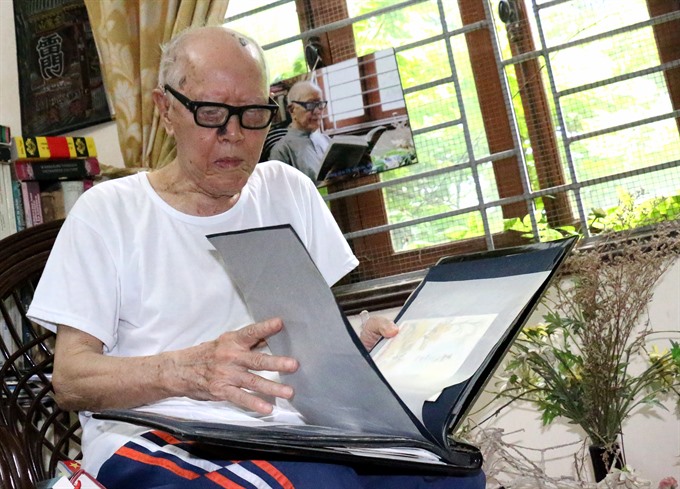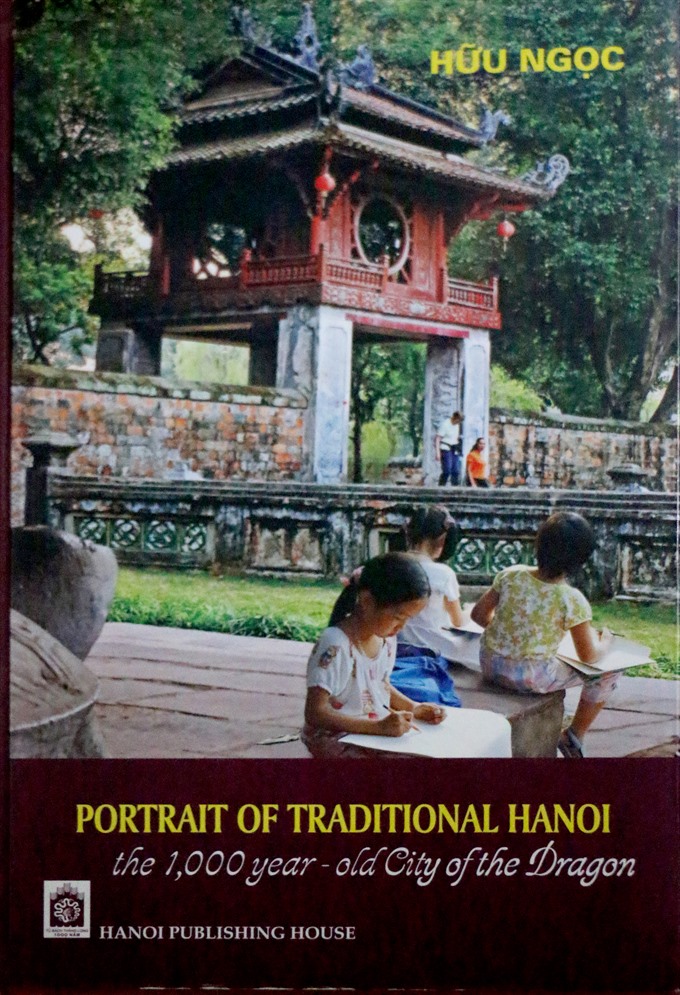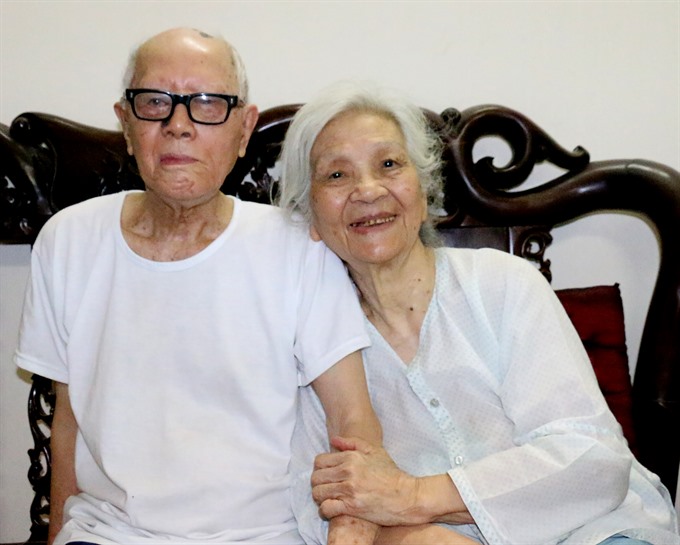By Ha Nguyen
Huu Ngoc was born and raised in Ha Noi, but it wasn’t until he left the city in 1946 to join the national resistance war against the French that he realised just how much he loved his hometown.
Living in deep forests, eating cassava and potato, he missed Ha Noi’s steamed glutinous rice, the fragrance of steamed green bean and particularly pho (beef noodle).
“When eating these foods daily, we could think them characterless. But when living far away, we understand their value,” the cultural scholar says.
While he could return to Ha Noi to savour his favourite foods after the war was over, he fears that today the wars, market economy, and exposure to western culture are polluting Vietnamese traditional villages.
Since his first extended trip outside the capital, he has dedicated his life to celebrating and preserving Vietnamese culture so that locals and foreigners will fight to protect it before it’s too late.
His many books depicting the history of Ha Noi in foreign languages such as English, French, German and Chinese help foreign friends learn more about the country’s capital.
 |
| Wisdom of age: At the age of 100, Ngoc still has a sound mind and invests nearly all of his time in work. |
Over the course of his career, he wrote 34 books and was the editor-in-chief of three magazines in French and English and director of the Foreign Languages Publishing House.
Now, the famous scholar and cultural researcher is among 10 individuals to be awarded the title "Outstanding Citizen of Ha Noi 2018", in recognition of his contributions to the country’s research on culture, his profound love of Ha Noi and particularly his work to bring Vietnamese culture to the world and bring world cultures to Viet Nam.
The event’s grand ceremony was held in Ha Noi on Tuesday, capping the career of the centenarian.
Though he is a scholar-warrior devoted to Vietnamese culture, he sees preservation as a key part of development and international integration, rather than a contradiction.
“To be developed, we should open doors to welcome world cultures to access new and interesting things, but we should not do so carelessly because we could lose our national identity,” he says. “On the other hand, we should popularize our culture to the world.”
His works about Ha Noi in foreign languges include My Ha Noi; Ha Noi, Who Are You; and Sketches for a Portrait of Ha Noi Culture, the last of which was used as a gift for world leaders attending the Francophone Summit in Ha Noi in 1997.
In the collection Ha Noi, Who Are You, Ngoc introduces Ha Noi history, the Old Quarter, ancient Royal Citadel, the outskirts, culinary treasures, famous characters through street names, spiritual life, culture, arts and education.
In his work My Ha Noi, he leads readers through a “symphony of streets”, to tour the city’s scenic and historial spots and learn its culture.
He has won high praise from fellow scholars, writers and artists.
 |
| Capital city: The cover of Ngoc’s Portrait of Traditional Ha Noi |
Poet Bang Viet, chairman of the Ha Noi Union of Arts and Literature Associations, says, “Ngoc is a great culturist; he exports Vietnamese culture to the world by popularizing and introducing Vietnamese people, their lifestyle and traditional customs and habits to foreigners. He has many major works to contribute to Ha Noi.”
As a result, Ngoc was awarded the Bui Xuan Phai Prize for the Love of Ha Noi last year. The prize, carrying the name of famous painter Phai, aims to encourage writers, artists and researchers to respect Ha Noi while also encouraging people to protect and preserve Ha Noi’s natural and beautiful charms.
The prize acknowledged Ngoc’s great contributions to the capital, says Bang Viet, chairman of the prize jury board then.
His career as a journalist and cultural researcher began seven decades ago, almost by chance.
After the World War Two, the French colonialists returned to Viet Nam. Ngoc joined the resistance force and at the age of 30 became the editor-in-chief of the French language paper L’Etincelle (1948-49) to call on French troops to stop fighting and support the Vietnamese people’s war of resistance.
After the Dien Bien Phu victory in 1954, peace returned to North Viet Nam, he began doing research on culture, writing articles and books in foreign languages.
Not only are his books beautiful documents of the city he loves, they also encourage readers and community members to fight to protect cultural heritage as Viet Nam develops, grows and deepens its connections with the rest of the world.
His book Wandering Through Vietnamese Culture, for example, tells the story of Duong Lam Village, which the author regards as a model for preservation. The people there are working to preserve its ancient customs and habits, and Ngoc hails them as heroes for protecting Vietnamese culture.
 |
| True love: Scholar Ngoc and his wife. |
The book has won many prizes, including the GADIF Prize by Ambassadors and the Francophone agency in Ha Noi.
Since retiring, he has been invited hundreds of times to talk about Viet Nam’s culture for more than 20,000 listeners including Kings and Queens of Sweden and Norway, Brazil’s president, university professors from many countries and others.
Ngoc was a chairman of the Sweden-Viet Nam and Denmark-Viet Nam Funds for Culture for more than 20 years in an effort to develop and preserve the Vietnamese culture.
Ngoc wrote hundreds of articles for Viet Nam News column Traditional Miscellany for nearly 20 consecutive years.
Ngoc has now become a “living museum” on Viet Nam’s culture, including Ha Noi.
Nearing age 100, he still goes to work by xe om ( motorbike taxi) to the The Gioi Publishing House as an advisor or talks with foreign guests at his home.
Ngoc’s most recent work, published in 2016, Tradition and Change, edited by Lady Borton and Elizabeth F. Collins of Ohio University, immediately received a great welcome from local and world readers.
“Viet Nam: Tradition and Change shimmers with Huu Ngoc’s thoughtful reflections and insights. The collection is designed for students in introductory classes and for other readers interested in Viet Nam. I hope they will also fall in love with the rich cultural heritage of the people and nation that is Viet Nam,” says Collins.
Furthermore, Ngoc has written other books about Viet Nam and some foreign countries such as Phac Thao Chan dung Van Hoa Phap (Sketches for a Portrait of French Culture), Manh Troi Bac Au (North European’s Sky), Ho So Van Hoa My (US Culture Documents), Sketches for a Portrait of Vietnamese Culture, and Discovery of Vietnamese Culture.
Apart from his books, he has invested nearly 20 years of time to write articles for the Vietnam News Agency’s French and English publications, Le Courrier du Vietnam and Viet Nam News.
To recognise his contributions, the State of Viet Nam conferred on him the Army Exploit Order and the Independence Order. The Swedish Government awarded him the Northern Star Order; the French Government honoured him with the Order of Academic Palms.
And he has at least one more great honour in the pipeline: Ngoc will celebrate his 100th birthday on December 22 this year. An early happy birthday to him! VNS